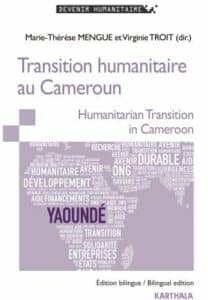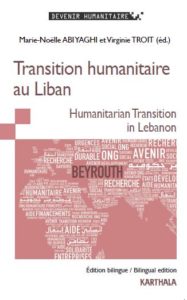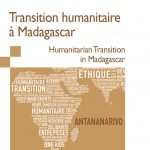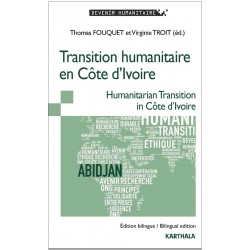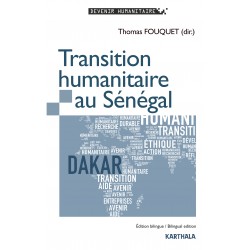Humanitarian Transition in Cameroon, 2023
Dedicated to the analysis of the humanitarian transition in Cameroon at all its scales of action, this 5th volume Devenir Humanitaire is the fruit of the meeting of international organizations, social science academics, national NGOs, state and territorial actors. Gathered in Yaoundé on November 14 and 15, 2018 by the French Red Cross Foundation, the Cameroon Red Cross, the Catholic University of Central Africa and the Institute of Research for Development, the participants opened a dialogue on the evolution of needs, the transformations of crises and humanitarian responses, the principles that guide them and the challenges that everyone must face.
Through articles, personal accounts and interviews, this book offers different perspectives on the humanitarian crises facing Cameroon, through analyses from different social science disciplines. It then focuses on the actors and practices at the heart of the response to the needs of the most vulnerable, in particular displaced populations.
Underlining the need for a more inclusive debate and a more egalitarian distribution of knowledge, the contributions gathered in this volume support a renewed reflection on the humanitarian sector, with a strengthened partnership with the academic sector in Cameroon and worldwide.
Humanitarian Transition in Lebanon, 2020
Dedicated to the analysis of the Humanitarian Transition in Lebanon, this 4th volume of the Devenir Humanitaire collection is the result of the meeting of international organisations, social science academics, national and transnational NGOs, state and territorial actors. Gathered in Beirut on 15 and 16 November 2017 by the French Red Cross Foundation, the Lebanese Red Cross and Saint Joseph University, they opened a dialogue on the transformations of humanitarian needs and practices, the principles that guide them and the challenges that each one must face.
Through articles, testimonies and interviews, this book offers different perspectives on the historical and regional context, the interactions and roles played by civil society actors, and then focuses on the changes in view of the most recent migratory movements. Underlining the need for a more inclusive debate and a more egalitarian dissemination of knowledge on humanitarian action, the contributions collated in this volume support a refl ection on the meaning of humanitarianism.
Humanitarian Transition in Madagascar, 2018
Dedicated to the Humanitarian Transition in Madagascar, this third volume of the Devenir humanitaire collection constitutes the outcome of the dialogues initiated between academics, non-governmental actors and institutions, gathered in Antananarivo on November 29th and 30th 2016 by the French Red Cross Fund to discuss their practices, the principles and issues of humanitarianism.
The first part of the book presents the background of the main humanitarian issues the Island is facing today. The second part addresses the particular interactions and power configurations that give the Malagasy aid sector its specific shape. The third and final part proposes a focus on the Malagasy health system, which is at the heart of national and international concerns, particularly in the face of the multidimensional crises in the country. Emphasising the need to take the “worldviews” of the recipients of aid into account, the contributions collated in this volume support a reflection on the meaning of humanitarianism.
Humanitarian Transition in Côte d’Ivoire, 2017
The second volume of the Devenir Humanitaire collection is dedicated to “humanitarian transition” in Côte d’Ivoire. It is the result of a meeting of academics, non-governmental actors and institutional representatives whom the French Red Cross Fund gathered together in Abidjan on November 18th and 19th 2015 to discuss their practices, the principles underlying them and wider issues related to the humanitarian sphere.
The first part of the book deals with the changes affecting the humanitarian landscape in Côte d’Ivoire and the second focuses on the Ebola virus, as a revealing case of some humanitarian issues at sub-regional level.
Emphasising the need to take the «worldviews» of the recipients of aid into account, the contributions collated in this volume support a reflection on the meaning of humanitarianism and how to accompany its contemporary transformations.
Humanitarian Transition in Senegal, 2016
The first volume of the Devenir Humanitaire collection is dedicated to “humanitarian transition” in Senegal. It is the result of a meeting of academics, non-governmental actors and institutional, reunited representatives, whom the French Red Cross Fund gathered together in Dakar on 5 and 6 November 2014 to discuss their practices, the principles underlying them and wider issues related to the humanitarian sphere.
The first part of the book offers to “think over the Senegalese humanitarian landscape (and beyond), from research to action”. It proposes a general overview of the current evolutions in the aid sector in Senegal, specifically with regards to the links between “civil society” and State. It explores the practical possibilities and modalities of a research in the service of a changing aid sector. The second part focused on the interactions between values (cultural, moral, citizen, etc) and social and humanitarian interventions.
Emphasising the need to take the «worldviews» of the recipients of aid into account, the contributions collated in this volume support a reflection on the meaning of humanitarianism and how to accompany its contemporary transformations.

